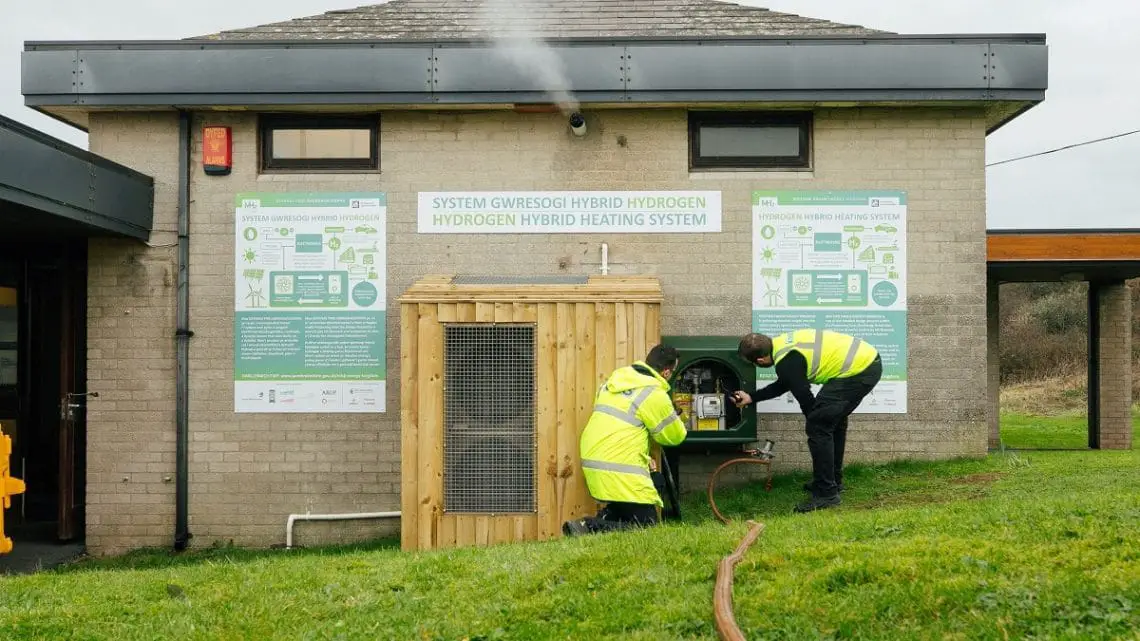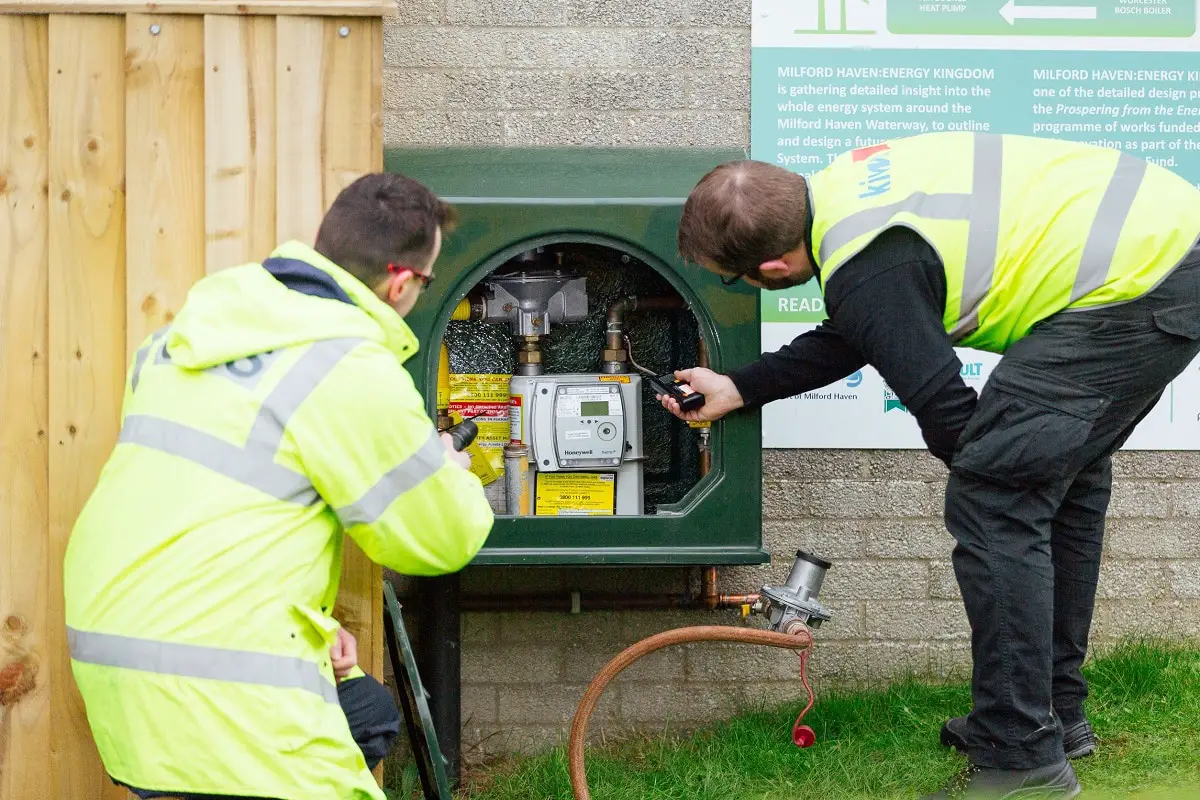
World’s first smart hydrogen hybrid heating system demonstrated in UK
March 3, 2022The system was unveiled in Pembrokeshire showing that the tech can play a role in reaching net zero targets.
The first smart hydrogen hybrid heating system in the world was recently demonstrated in Pembrokeshire, United Kingdom. The team behind the unveiling is viewing the demonstration as proof that this tech can play a role in reaching the UK’s net zero targets.
The tests were part of the Milford Haven: Energy Kingdom project, funded by UK Research and Innovation.
The demonstration of the hydrogen hybrid heating system was part of the Milford Haven: Energy Kingdom project that received its funding from UK Research and Innovation. The trial was successfully implemented by collaborators including Passive UK, Port of Milford Haven, Kiwa UK, Wales & West Utilities, Offshore Renewable Energy Catapult, Worcester Bosch, and Pembrokeshire County Council.
The demonstration brought together an H2-fueller boiler with an electric air source heat pump. The result was combined with smart control technology. The test was held in a Port of Milford Haven commercial building. The Port of Milford Haven is the country’s largest energy port.
The hydrogen hybrid heating system is seen as one of many critical strategies for meeting climate targets.
The UK needs to slash its home heating and hot water greenhouse gas emissions by an estimated 95 percent in order to meet its UK Net Zero targets for 2050. Hybrid heating technology is expected to be important for both domestic and commercial purposes as the country seeks to reach that target according to The Energy Saving Trust data.
This type of heating system can provide greater flexibility to make it possible to toggle between using green gases such as H2 at some times and renewable electricity when it’s available. The use of clean fuel in this way can open the opportunity to fully decarbonize residential and commercial heat while making certain that there is a priority on carbon emission reduction and cost control.

Hydrogen hybrid heating systems with an affordable cost are meant to provide practical decarbonization.
Hydrogen hybrid heating systems may provide homes and businesses with the opportunity to benefit from practical and affordable decarbonized heating options. Research indicates that nearly 50 percent of properties in the country aren’t appropriate for standalone heat pumps because of limitations such as poor thermal properties.
The world’s first smart hydrogen hybrid heating system has been demonstrated in Pembrokeshire proving technology that could help the UK get to Net Zero.https://t.co/ywS7vfAeS6
— PembrokeshireCC (@Pembrokeshire) February 22, 2022
Other reasons that standalone heat pumps might not be appropriate include the cost and disruption that would be involved in altering many of the old houses across the country with the necessary efficiency improvements such as new radiators, wall and floor insulation.
The newly demonstrated systems are less expensive and far less disruptive as an option when compared to heat pumps. These can be fitted in as a direct and rapid replacement to a conventional boiler system.
For this particular test, the H2 was delivered in bottles by Kiwa UK to Worcester Bosch.
The Worcester Bosch boiler used the H2 for the simulation of periods when renewable electricity wasn’t available for powering a heat pump, or when additional heat was required beyond what would be possible exclusively through renewable energy.
Passiv UK designed the smart controls used in the tested hydrogen hybrid heating system. It provided seamless integration with the system and automatically switched between the hydrogen boiler and air source heat pump. The system worked by providing a new GB energy generation mix and renewable electricity available assessment for the system every 2 minutes. Following the assessment, it requests that the boiler operate either on the renewable electricity when available or on H2 when it was not or when additional heat was required.
The hydrogen hybrid heating system demonstration proved that this type of option could work.
“Having already established itself as the UK’s Energy Capital, the Milford Haven Waterway is now at the centre of a renewable energy revolution, with huge potential to become the low carbon energy capital of the UK, safeguarding thousands of local jobs and creating thousands more new ones,” said Port of Milford Haven Commercial Director Steve Edwards. “To get to Net Zero, we must deliver Net Zero power, transport and heat and we have all the necessary components here on our doorstep in Pembrokeshire to act as a vital cluster of national significance.”
“We’re committed to playing our part in helping communities across Wales and south west England go green. Between 2021 and 2026 we’re investing £400m to prepare our network to transport green gas like hydrogen and biomethane,” said Net Zero and Sustainability head Matt Hindle at Wales & West Utilities, the Wales and south west England gas network project partner, in a statement about the hydrogen hybrid heating system. “Hybrid heating systems can be easily retrofitted to existing housing stock, without costly changes to radiators or internal pipework, keeping disruption to homes and communities to a minimum. This trial has demonstrated how they can work with hydrogen in place of natural gas.”



 With over 15 years of reporting hydrogen news, we are your premier source for the latest updates and insights in hydrogen and renewable energy.
With over 15 years of reporting hydrogen news, we are your premier source for the latest updates and insights in hydrogen and renewable energy.
The suggestion that some homes are unsuited to heating by heat pumps due to poor thermal performance ignores the option of using a high temperature heat pump. Admittedly, the coefficient of performance of these heat pumps is not as good as more conventional heat pumps, but they are nevertheless more energy efficient than hydrogen-fired boilers. Even electric resistance heaters are more energy efficient.
Whatever the thermal permormances etc maybe, a heat pump ofwhatever ilk is basically a fridge in reverse: it needs electricity generated from somewhere. H2 boilers burn , produce water and the heat is very controllable. The electricity to produce H2 can be from near zero using catalysts curently under scale development. All in all the comparison you make is a poor one. Heat pump are essentially stuck. H2 is tommorrows world with wind and water.
Incorporate a fuel cell into the boiler to make it a hydrogen-fired micro CHP unit which can then power the heat pump and also boost the heat pumps’s water temperature to 60+ C with the reject heat from the cell (which may be around 90 C). The H2 ‘boiler’ then delivers 140 kWh hot water for a hydrogen input on 70 kWh. If its electrolytic H2 then it would require ~100 kWh intermittent electricity to produce. Overall, 1 kWh intermittent electricity delivers 1.4 kWh hot water on demand, while aiding grid power matching. Fuel cells cost but windless cold snaps will spike Grid demand and that costs too.
100 units of electricity > 70 units thermal of H2 delivered to home (inc transmission energy / losses) > fuel cell+HP > 35 units x COP 3 thermal + 35 units thermal = 140 units thermal supplied to CH
In all these discussions, we need to remember that burning hydrogen in air will produce harmful nitrogen oxides (NOx) that can kill from long term exposure to them and they are are bad for the environment (acid rain). Our long term strategy should be to stop burning anything in air. While buildings that are poorly insulated may not be suitable for heat pumps, in the long term they will be better insulated and then suitable for heating by heat pumps, preferably by ground source that are more efficient especially in cold weather. All new buildings should be heated with heat pumps which have an energy gain of 3:1
Since the 1990’s Germany developed the Passivhaus standard, a super insulated structure requiring no heating! It utilises solar gain and a heat recovery ventilation system, saving 90% in energy consumption! Yet here we are 3 decades latter, in the midst of an energy crisis still debating ‘efficient’ forms of heating!?